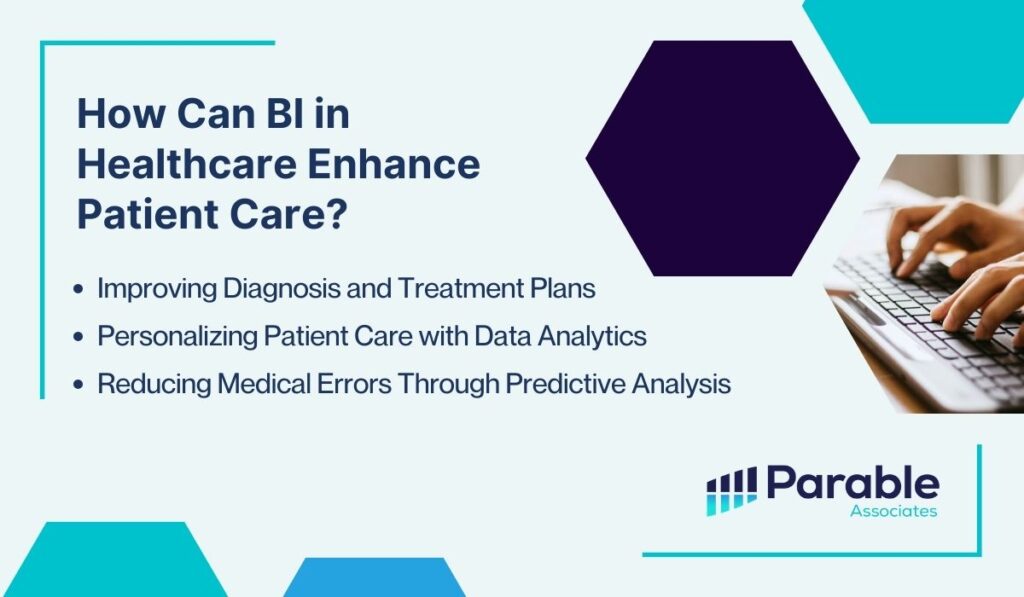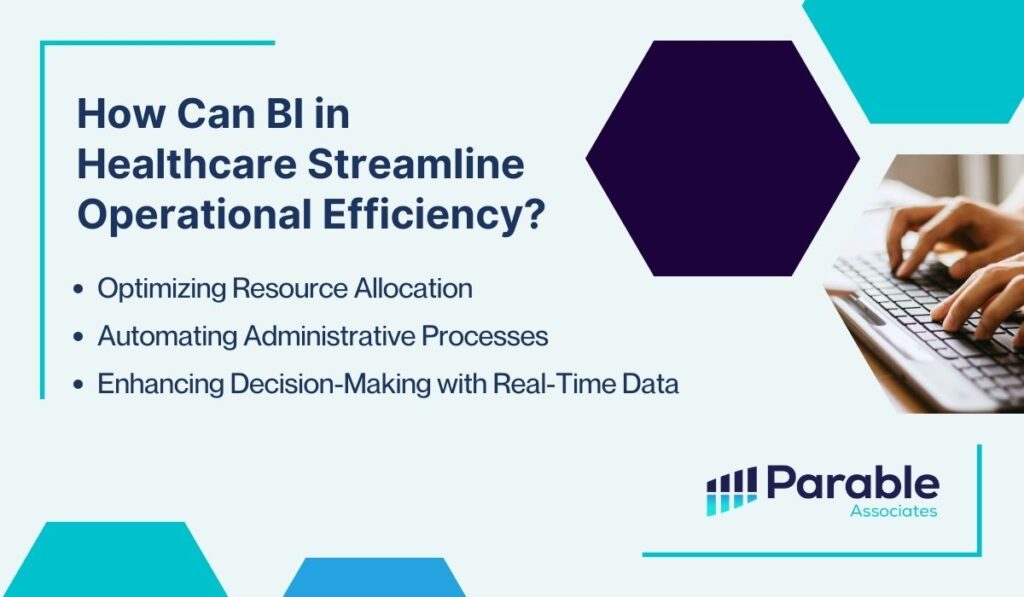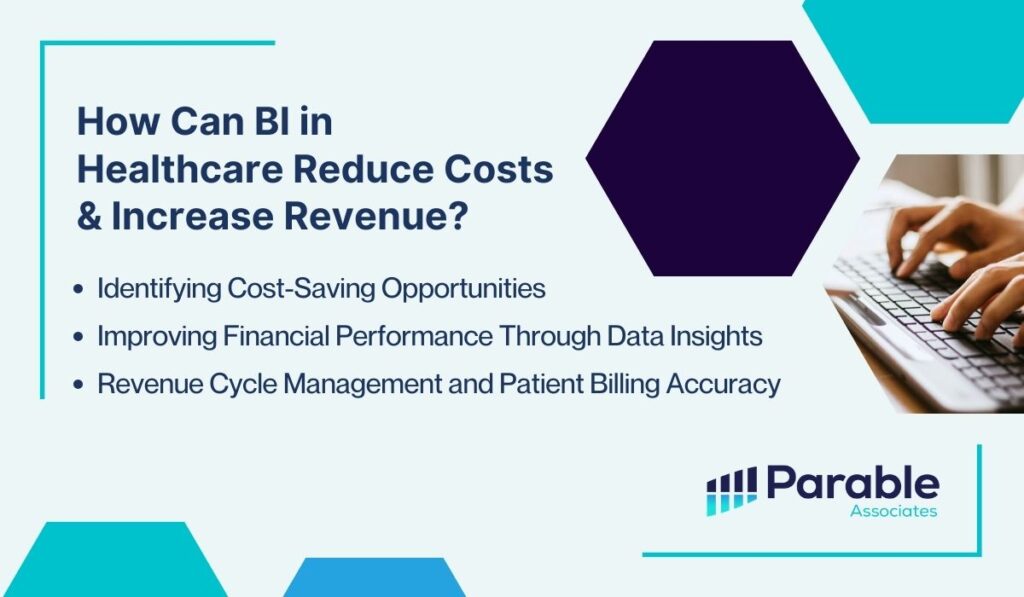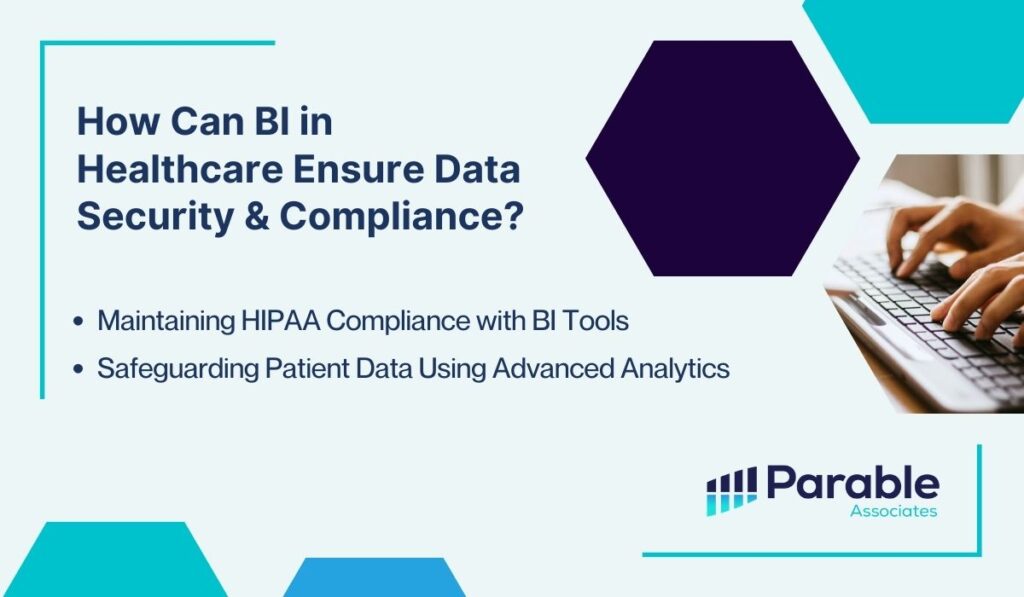The healthcare industry is rapidly evolving, with data playing a crucial role in transforming patient care, reducing costs, and improving operational efficiency. With this in mind, it’s no surprise that implementing Business Intelligence (BI) in healthcare practices is becoming more essential than ever. By leveraging advanced data analytics by adopting BI in healthcare, healthcare providers can gain valuable insights, streamline their processes, and ultimately deliver better outcomes for patients.
Understanding Business Intelligence in Healthcare
What is Business Intelligence (BI)?
Business Intelligence (BI) refers to the technology-driven process of collecting, analyzing, and presenting business data to help organizations make informed decisions. In the context of healthcare, BI involves using data analytics tools to gather information, analyze patterns, and generate actionable insights that can improve patient care, optimize operations, and boost financial performance.
How BI is Applied in Healthcare Practices
BI in healthcare is used to analyze patient data, track hospital performance metrics, manage healthcare resources, ensure regulatory compliance, and more. Through user-friendly dashboards, reports, and visual analytics, healthcare providers can quickly access critical information that guides their clinical and administrative decisions. The goal of implementing BI in healthcare is to enhance decision-making processes by transforming raw data into strategic insights, ultimately leading to better patient care and improved organizational efficiency.
4 Ways BI in Healthcare Can Improve Your Practice
Enhancing Patient Care
Improving Diagnosis and Treatment Plans
One of the most significant benefits of implementing BI in healthcare is its ability to improve diagnosis and treatment plans. BI tools analyze large volumes of patient data, including medical histories, lab results, and treatment outcomes, to identify patterns that can guide more accurate diagnoses. This data-driven approach helps healthcare providers recommend the most effective treatment plans, reducing the trial-and-error phase and ensuring more consistent patient care.
Personalizing Patient Care with Data Analytics
Healthcare BI streamlines personalized patient care by creating detailed patient profiles that consider factors such as their medical history, genetic factors, lifestyle, and more. By utilizing this data, healthcare professionals can tailor treatment plans to each patient’s unique needs, which leads to more effective outcomes and better overall health.
Reducing Medical Errors Through Predictive Analysis
Predictive analytics is a powerful healthcare BI aspect that helps reduce medical errors. By analyzing data from past cases, BI tools can predict potential complications and adverse reactions before they occur. This proactive approach allows healthcare providers to take preventive measures that minimize the risk of errors and improve patient safety.

Streamlining Operational Efficiency
Optimizing Resource Allocation
Effective resource allocation remains a challenge for many healthcare practices. BI tools provide insights into staffing, equipment utilization, and patient flow, ensuring that resources are used efficiently. These data-driven strategies reduce wait times, enhance patient experience, and optimize the overall quality of care delivered. BI helps healthcare providers make informed decisions about where to allocate their resources to ensure maximum efficiency.
Automating Administrative Processes
Automation is another major advantage of BI in healthcare. By automating routine administrative tasks, such as patient billing, appointment scheduling, and data entry, healthcare providers can significantly reduce manual errors and save time. Automation also allows staff to focus more on high-skill tasks. By streamlining administrative processes, BI helps improve overall service quality, making healthcare practices more efficient and patient-focused.
Enhancing Decision-Making with Real-Time Data
The real-time data analytics provided by BI are crucial for quick and effective decision-making. Healthcare providers can monitor patient conditions, track treatment progress, and make immediate adjustments to care plans based on the latest information available. Being able to respond to patient needs quickly and effectively leads to better results and more efficient care.

Reducing Costs and Increasing Revenue
Identifying Cost-Saving Opportunities
Implementing BI in healthcare helps identify areas where costs can be reduced without compromising care quality. By analyzing expenses related to supplies, staff, and procedures, BI tools can uncover inefficiencies and recommend changes that lead to significant savings. These insights help healthcare organizations allocate their budgets more effectively.
Improving Financial Performance Through Data Insights
The data insights gained through BI analytics also play a key role in enhancing a healthcare provider’s financial performance. BI tools help track important financial metrics, such as revenue cycles, billing errors, and claim denials. This allows practices to address issues promptly and leads to better financial health and sustainability for the organization.
Revenue Cycle Management and Patient Billing Accuracy
Accurate patient billing and efficient revenue cycle management are essential for the financial stability of any healthcare practice. BI in healthcare supports these functions by analyzing patient data to ensure that billing is accurate. This level of precision helps to boost revenue by minimizing errors and claim denials, while also building trust with patients.

Ensuring Data Security and Compliance
Maintaining HIPAA Compliance with BI Tools
Data security and compliance are essential in the healthcare industry. BI provides tools that help healthcare organizations maintain compliance with regulations such as the Health Insurance Portability and Accountability Act (HIPAA). These tools ensure that patient data is stored, accessed, and shared securely, reducing the risk of data breaches and fines.
Safeguarding Patient Data Using Advanced Analytics
Advanced analytics in BI solutions help healthcare providers identify potential vulnerabilities in their data systems. By continuously monitoring access logs and detecting unusual activities, BI tools can safeguard sensitive patient information. This level of protection is essential to maintaining patient trust and adhering to regulatory standards.

Challenges of Implementing BI in Healthcare
Data Integration Issues
While the benefits of BI in healthcare are clear, data integration issues are a common challenge to be mindful of. Healthcare organizations often use multiple program systems that may not easily communicate with each other. Implementing a unified BI platform requires integrating data from different sources, which can be complex and time-consuming without the tools and know-how to do so effectively.
Overcoming the Learning Curve for Healthcare Staff
Another challenge of implementing BI is the learning curve associated with new technology. Healthcare staff may require training to use BI tools and interpret the data insights effectively. Investing in proper training and support is crucial to ensure that the team can maximize the benefits of BI systems.
Cost Considerations and Return on Investment (ROI)
The cost of healthcare BI can be a concern for some organizations. However, the long-term benefits such as improved efficiency, reduced costs, and enhanced patient care make the ROI substantial. Proper planning and a clear strategy can help manage these costs effectively.

Unlock the Full Potential of BI in Healthcare with Parable Associates
BI implementation isn’t optional for healthcare organizations that want to stay ahead in a competitive market, it’s essential. At Parable Associates, we offer a comprehensive suite of BI services designed to drive your organization’s success. From initial implementation to ongoing customization, maintenance, and support, our solutions cover every phase of BI dashboard development. We also provide proactive analytics services to ensure your team has the insights needed to make informed, data-driven decisions. With Parable Associates handling your data needs, you can focus on growth while we turn complex analytics into actionable insights — contact us to schedule a discovery call today.
BI Implementation FAQs
Business Intelligence (BI) in healthcare refers to the use of data analytics tools to improve decision-making processes in medical practices by analyzing and interpreting patient and operational data.
There are many benefits of using healthcare BI, including enhanced patient care, streamlined operations, reduced costs, improved financial performance, and better decision-making capabilities.
BI enhances revenue cycle management by providing accurate billing data, reducing claim denials, and improving overall financial processes. Lorem ipsum dolor sit amet, consectetur adipiscing elit, sed do eiusmod tempor incididunt ut labore et dolore magna aliqua. Ut enim ad minim veniam, quis nostrud exercitation ullamco laboris nisi ut aliquip ex ea commodo consequat.
Common challenges include data integration issues, the learning curve for staff, and managing the costs of deployment.
Parable Associates provides a comprehensive suite of BI services that cover every aspect of BI implementation, from dashboard setup and customization to maintenance and proactive analytics. With expertise in designing custom data architecture and interactive dashboards, the team ensures clear visualizations of KPIs, expenses, budgets, and other key metrics. Additionally, proactive analytics and data-driven recommendations help streamline operations, boost productivity, enhance client services, and optimize the revenue cycle, turning complex data into actionable insights that drive organizational success.

